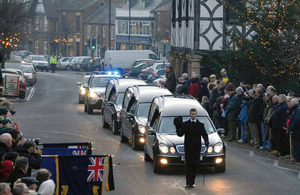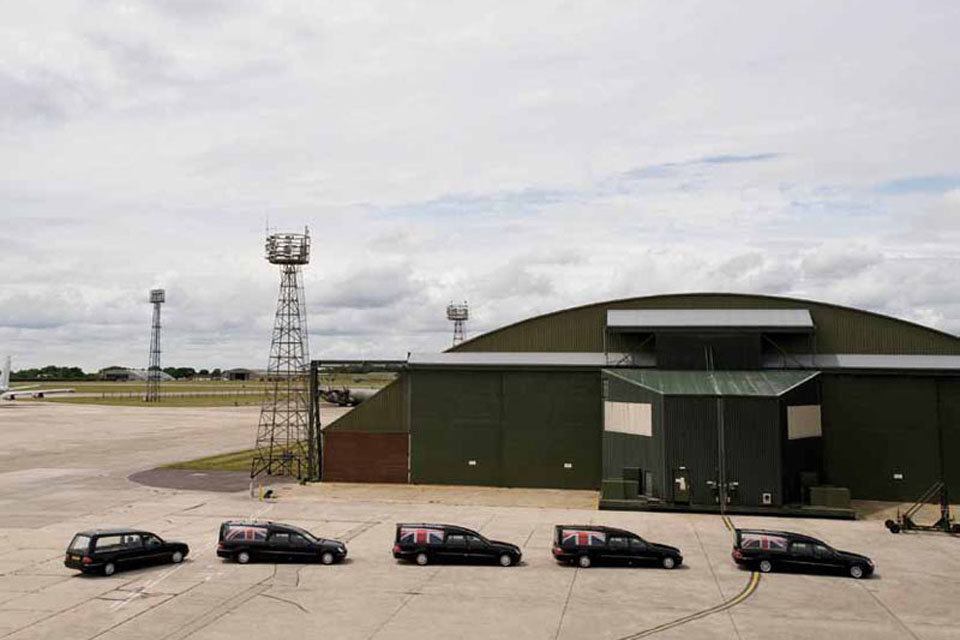Defence Inquests Unit: helping to find the answers
The Defence Inquests Unit's support to coroners is helping bereaved families find out the facts

Funeral cortege of a serviceman killed on operations [Picture: LA(Phot) Alex Knott, Crown Copyright/MOD]
When the worst has happened, the death of a loved one, you need all the support you can get to help you cope, not just with the emotions but with the practicalities of death.
Sadly, until just a couple of years ago, while many of the welfare and compassionate mechanisms were in place to support Service families who had lost a relative on operations, or on training, the quality of the inquest process was undoubtedly in need of improvement:
Back in 2007/08, I think it would be fair to say that the MOD was struggling with how we handled inquests because there was no focus,” said Mike Venables, head of the award-winning Defence Inquests Unit.
The families were dissatisfied by the service they were getting and by the way that inquests were working. Many didn’t understand why we were having them or what they were for.
As a response, the Army, for the majority of the fatalities were soldiers, set up Project Ajax to improve the situation. In 2008 it became tri-Service, and so the Defence Inquests Unit (DIU) was formed:
Our role,” said Mike, “is to support bereaved families by making sure that the coroner is in the best place to do what is necessary. That means making sure they have everything they need and that the process is satisfactory and done in a timely fashion.
An inquest, by its very nature, is never going to be a good experience, but it is the last formal stage, it’s done publicly, and it’s an opportunity for the families to ask any questions they want to ask.
The purpose of an inquest is for an independent coroner to establish the facts of what happened - who has died, when, where, and how did it happen. It is not about apportioning blame.
But one of the biggest problems that coroners faced was being able to establish exactly what had happened in situations which were completely alien to them. Many didn’t understand what they were dealing with, nor what a theatre of war was like:
Some of the more inexperienced were dealing with operational incidents as if they had occurred on the local high street,” said Colonel Clive Newell, who leads the DIU’s team of military case officers.
Military families have a very good idea of what their sons, daughters, wives etc are doing; so to sit through an inquest with bizarre questions being asked of a witness by a coroner who wasn’t situationally-aware left a bad taste in their mouths.
So from the start it was clear that the DIU had to engage with coroners and offer to make their jobs easier by furnishing them with all the reports and information they needed for the case and help them gain as complete an understanding of the context of the incident as they could.
To make things easier still the case officers now help to identify and locate military witnesses.
At first this was not so straightforward:
Credibility was our biggest challenge. Coroners felt initially ‘DIU - here we go, they’re out to pull the wool over our eyes’,” said Colonel Newell.
That was never the intention. They have realised over the years that we are completely transparent and we are as helpful as we can be, because we want our families to have the very best level of service.
If a soldier has been killed because of negligence, or lack of equipment, we would not be doing our job if we tried to sweep things under the carpet.
Strong relationships based on trust have been built up since those early days, and coroners who want any additional information, or an explanation of something they don’t quite understand, don’t hesitate to pick up the phone and call the case officers for help.
That additional information can involve arranging for a coroner to be shown how an SA80 rifle is cleaned, a flight in a particular type of helicopter, or a translation of military jargon.
To help coroners gain more of an understanding of the context of a theatre of operations, two years ago the DIU organised a familiarisation event for them at Warminster:
We showed them the vehicles and kit used on ops. We set up demos for them, mine clearance drills, let them experience the weight of the packs that troops carry, so if something like that should come up in a future case they could say ‘right I’ve seen this before, I know something about this’,” said Colonel Newell.
The coroners found the experience so useful that it has now become an annual event.
DIU case officers also help coroners find their way through the weighty reports that once used to simply land on their desks with a thump.
Case officers read through the Royal Military Police reports, Special Investigation Branch reports and witness statements before handing them on to the coroner:
We read through everything first and redact them for security - which is something that they do worry about so we explain that. Then there can be thirty or more witness statements for them to look through,” said Colonel Newell.
We point them to what we see as the salient information and suggest who we see as the key witnesses who should be called to the inquest. We provide them with a Rolls-Royce service.
And they don’t always understand military hierarchy,” said Lieutenant Colonel Freddie Kemp of the Parachute Regiment.
We can explain the roles of the company, platoon and section commanders and say, ‘with respect, this is the chap you need to speak to, he will be the one who had understanding of the threat, he will know about the planning of the operation, the availability of kit, how long the guys were on the ground - he is the bloke who will know’.
Being independent, the coroners can of course choose to disregard all this advice. But that rarely happens. David Ridley, coroner for Wiltshire and Swindon, said:
The DIU’s focus on achieving the smooth running of the inquest process is exemplary. I know that the unit’s involvement has been very well received by families and Service personnel witnesses alike, who often have to relive traumatic events in the alien environment of a court.
Providing support to the witnesses is a critical part of the unit’s work:
It can be a hugely difficult experience for some witnesses,” said Mike Venables. “They have to relive the death of a friend, and quite possibly they were injured in the same incident. They may have spent six months in hospital because they were hit by shrapnel from the same explosion that killed their mate.
The DIU has produced a DVD explaining the role and purpose of inquests, and what will be expected of the witnesses. Case officers brief them:
But what we don’t do is coach them. All we say is, ‘you’ve got nothing to fear from this, all you have to do is tell the truth as you see it’. It can be a cleansing experience,” said Mike.
Even though inquests are supposed to be anything but adversarial, a coroner’s court can be daunting. To help establish a proper military context, and help witnesses feel more at ease, they are advised to attend wearing their Service dress rather than civilian clothing as they used to.
Case officers also appear in uniform. Before the unit came into being, the MOD tended to be legally represented at inquests:
But we took the view that some families see that as intimidating,” said Mike. “It looked as though the big bad Ministry had turned up, so now, even if the families choose to have a barrister, we tend not to, we just send a case officer.
This not only helped to ease the tension at inquests, but has reduced legal representation costs by more than £1.3m.
But the decision was not about saving costs insists Mike. If the case has complicated legal issues, or if there are particular security implications, the DIU will have legal representation:
If it is a multiple incident, and if there are several families there who are legally represented, we might have a rep - if only as a bit of a buffer for the witnesses. It can be pretty intimidating for ‘Private Snooks’ if he’s facing two or three barristers.
Which all underlines the unit’s open approach to inquests. Ask any member of the team and they will tell you categorically they are not there to get the MOD off the hook:
I have no difficulty whatsoever,” said Mike, “if an incident has happened and the Department has done something wrong, it is entirely right that the coroner should criticise us. And we will make sure they have the information necessary to do so on an informed and intelligent basis.

A funeral cortege leaves RAF Lyneham [Picture: Sergeant Ian Forsyth, Crown Copyright/MOD]
Once a coroner has concluded an inquest and reached a verdict, if he feels there is something that needs raising which might help prevent future deaths, he will write a report, known as a Rule 43, to the Secretary of State. Again the DIU can help:
Rule 43 reports are really important,” said Lieutenant Colonel Kemp. “What we can do is let the coroner know of any improvements that have been made since the time of the death. We can refer him to any similar cases and say ‘these were the lessons learned, this is what happens now, this is the new kit’ - it can save his time and it can reflect to families that the death of their relative was not totally in vain.
Last year the DIU won the Operational Excellence Award at the annual Civil Service Awards:
It was a huge tribute to the guys,” said Mike. “The job they do really makes a difference. What they do matters and it was great to see them get recognition for that.
Talking to the team, you are left in no doubt that they find their work rewarding, even if, at times, it is distressing:
I like to think we’ve done a good job, but I can’t call it satisfying - because it’s such a sad job,” said Colonel Newell.
Lieutenant Colonel Kemp nods his agreement:
You get the feeling that you have done your duty. Everyone has got as much out of it as they can. We’ve cut down the time that inquests were taking; we have helped the coroners to provide our families with a better service. That is satisfying.
DIU facts
- reducing the level of legal representation has saved more than £1.3m
- 522 inquests have been completed since 2001. Last year the DIU worked on 95 inquests, 79 of which were operational
- overall, the DIU has responded to 32 coroners’ reports; four in 2011 and eight in 2010. All were responded to within 56 days
- the DIU team comprises seven civilians and five military staff
- in 2011 the average time taken for an operational inquest was 12 months